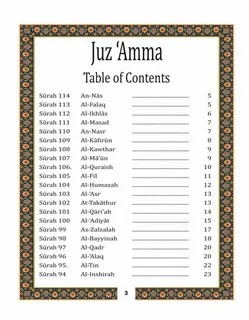In the vast ocean of Islamic scriptures, one jewel that glistens with profound significance is the collection of Surahs found in Juz Amma. These verses hold a special place in the hearts of Muslims worldwide, as they encapsulate essential teachings, morals, and guidance. In this article on Arabian Tongue website, we will embark on a journey to explore the Juz Amma Surahs List, shedding light on their significance and the wisdom they offer to humanity.
Understanding Juz Amma

Before we delve into the specifics of the Juz Amma Surahs List, let’s first grasp the concept of Juz Amma itself. Juz Amma is the 30th and final section of the Holy Quran, comprising 37 Surahs. These Surahs are relatively shorter in length compared to the rest of the Quran but are by no means lacking in depth or importance.
The Purpose of Juz Amma
Juz Amma serves as a summary of the Quran’s core message, making it accessible to all. It is often the starting point for individuals learning to read and recite the Quran, thanks to its brevity and clarity.
Significance of Juz Amma Surahs
The Surahs in Juz Amma cover a wide range of topics, including morality, guidance, stories of past prophets, and the hereafter. They are a source of immense spiritual nourishment and serve as a reminder of the fundamental principles of Islam.
Exploring the Juz Amma Surahs List

Now that we have laid the groundwork, let’s dive into the Juz Amma Surahs List. Here, we will provide an overview of each Surah, highlighting its key themes and messages:
1. Surah An-Naba (The Announcement)
This Surah begins with a powerful question, inviting reflection on the creation of the universe and the purpose of life. It emphasizes the consequences of one’s actions and the ultimate accountability before the Creator.
Recommend: Islamic Calendar.
2. Surah An-Nazi’at (Those who drag forth)
An-Naziat delves into the theme of resurrection and the Day of Judgment. It vividly portrays the scenes of the Day of Resurrection and serves as a stark reminder of the consequences of one’s deeds.
3. Surah Abasa (He frowned)
This Surah highlights the incident when the Prophet Muhammad (peace be upon him) frowned at a blind man seeking guidance. It emphasizes the importance of humility and the equal worth of all individuals in the eyes of God.
4. Surah At-Takwir (The Overthrowing)
At-Takwir addresses the cosmic changes that will occur on the Day of Judgment, underlining the insignificance of worldly possessions compared to eternal life.
5. Surah Al-Infitar (The Cleaving)
This Surah elaborates on the resurrection and the revelation of deeds. It emphasizes the recording of one’s actions and their presentation on the Day of Judgment.
6. Surah Al-Mutaffifin (Those who give less)
Al-Mutaffifin condemns fraudulent business practices and unfair dealings. It serves as a reminder of the importance of honesty and integrity in all transactions.
7. Surah Al-Inshiqaq (The Splitting Open)
This Surah describes the cosmic upheaval that will take place when the earth is split open and the dead are resurrected. It vividly portrays the events of the Day of Judgment.
8. Surah Al-Buruj (The Mansions of the Stars)
Al-Buruj narrates the story of the martyrs who stood firm in their faith and were persecuted. It serves as an inspiration for believers to remain steadfast in the face of adversity.
9. Surah At-Tariq (The Morning Star)
At-Tariq highlights the divine order in the universe and the importance of reflecting on the signs of God’s creation.
Read more: Manners Of Reading The Quran.
10. Surah Al-Ala (The Most High)
Al-Ala focuses on the attributes of God and the importance of worship. It encourages believers to recognize God’s greatness and submit to His will.
11. Surah Al-Ghashiyah (The Overwhelming)
This Surah describes the events of the Day of Judgment in detail, emphasizing the separation of the righteous from the wicked.
12. Surah Al-Fajr (The Dawn)
Al-Fajr tells the stories of past nations and their downfall due to their disobedience to God. It serves as a cautionary tale for humanity.
13. Surah Al-Balad (The City)
This Surah calls for reflection on the blessings of one’s homeland and the responsibility to care for the less fortunate.
14. Surah Ash-Shams (The Sun)
Ash-Shams explores the concept of the human soul and its potential for both good and evil. It emphasizes the importance of self-purification.
15. Surah Al-Lail (The Night)
Al-Lail contrasts the qualities of good and evil, encouraging believers to choose the path of righteousness.
How to Memorize Juz Amma?

Memorizing Juz Amma, the 30th part of the Quran, is a noble and rewarding endeavor for Muslims around the world. It contains 37 chapters and is often the starting point for those embarking on the journey of Quranic memorization:
- Setting Your Intention: Before diving into the practical aspects of memorization, it’s crucial to set your intention (niyyah) correctly. Memorizing the Quran is an act of worship, and a sincere intention will bring blessings to your efforts.
- Creating a Study Schedule: A well-structured study schedule is essential for efficient memorization. Allocate specific times daily and stick to your plan. Consistency is key.
- Start with Short Surahs: Begin with shorter chapters like Surah Al-Fatiha and Surah Al-Nas. These are relatively easier to memorize and will boost your confidence.
- Repetition and Revision: Regularly revise what you’ve memorized to reinforce your memory. Repetition is the mother of retention.
- Using Visualization Techniques: Visualizing the verses as you recite them can aid in memorization. Try to picture the words in your mind as you recite.
- Recite Aloud: Auditory learning can be effective. Recite the verses aloud, paying attention to correct pronunciation and tajweed.
- Memorization Apps: Apps like “Memorize Quran for Kids & Adults” and “Ayat – Al Quran” provide interactive ways to memorize with ease.
- Seek Help from a Teacher: Having a qualified Quran teacher can make a significant difference. They can correct your pronunciation, provide guidance, and motivate you.
- Join a Memorization Group: Being part of a memorization group can create a supportive environment where you can share your progress and challenges with others.
- Utilize Technology: In today’s digital age, there are numerous apps and websites designed to aid in Quran memorization. These tools offer audio recitations and memorization tracking.
- Repetition and Consistency: The road to memorizing Juz Amma is long and requires dedication. Repetition and consistency are your allies on this journey.
- Daily Quran Reading: Incorporate daily Quran reading into your routine, even beyond your memorization sessions. This will keep your connection with the Quran strong.
- Patience and Perseverance: Memorizing Juz Amma is not a sprint but a marathon. Stay patient and persevere through challenges.
- Online Quran Classes: Consider enrolling in online Quran classes if you prefer structured learning with guidance from experienced tutors.
FAQs
What is the significance of Juz Amma in the Quran?
Juz Amma is the 30th section of the Quran and serves as a summary of its core message, making it accessible to all.
How many Surahs are included in Juz Amma?
Juz Amma comprises 37 Surahs, each with its unique message and significance.
Can non-Muslims read and learn from the Juz Amma Surahs?
Absolutely! The Juz Amma Surahs contain universal moral and spiritual lessons that can benefit people of all faiths or no faith.
Why are the Juz Amma Surahs relatively shorter than other Quranic sections?
The Juz Amma Surahs are shorter in length to make them more accessible for individuals learning to read and recite the Quran.
How can I start studying the Juz Amma Surahs?
You can begin by reading the Surahs in a translation that you understand and seeking guidance from knowledgeable individuals or scholars to gain a deeper understanding of their meanings and implications.
Conclusion
The Juz Amma Surahs List is a treasure trove of wisdom and guidance for Muslims and seekers of truth alike. These Surahs touch upon essential aspects of life, morality, and spirituality, serving as a beacon of light in a world often clouded by confusion. As you explore these Surahs, may you find the clarity and inspiration they offer on your journey of faith.


